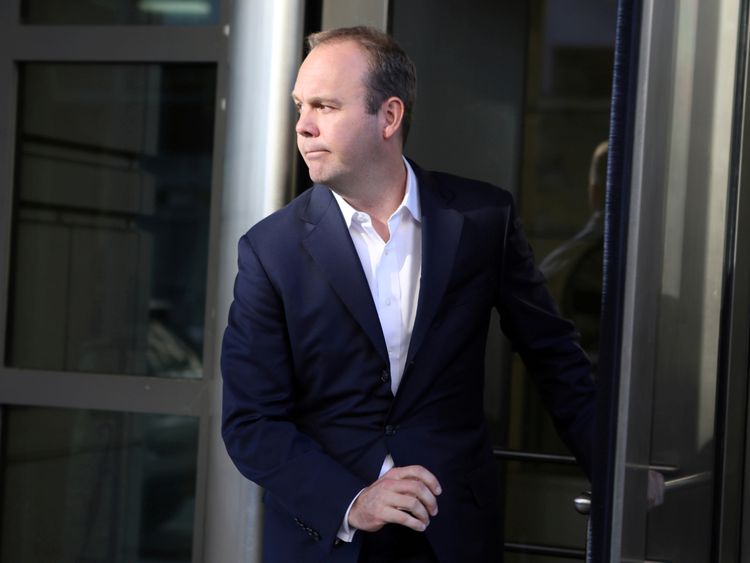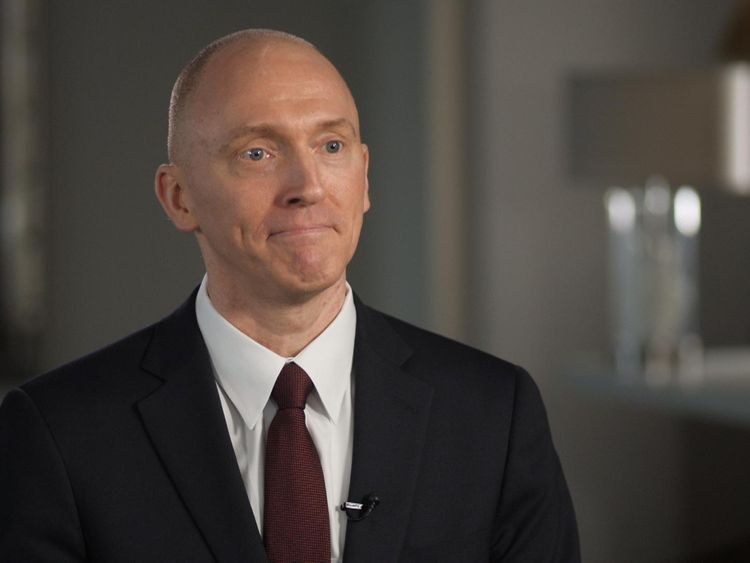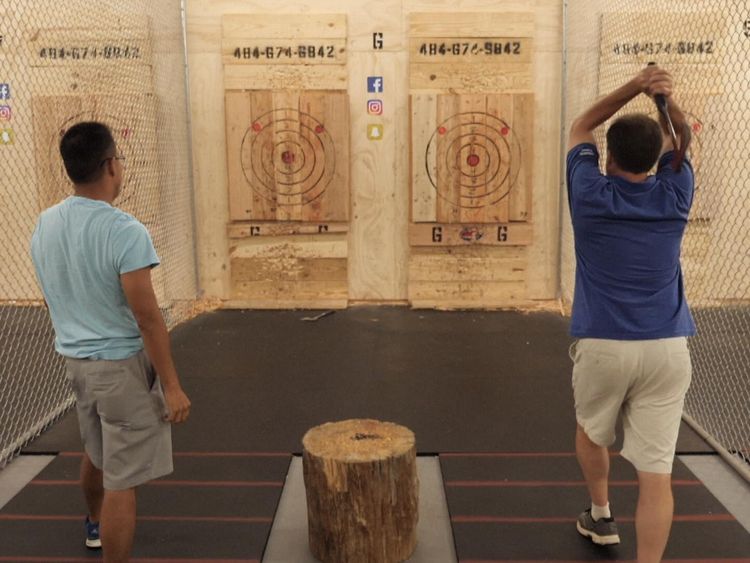Donald Trump's former presidential campaign chairman Paul Manafort has become the first Trump associate to stand trial as part of special counsel Robert Mueller's Russia investigation.
The 69-year-old is charged with bank fraud and tax evasion and could spend the rest of his life in jail if convicted. He denies all the charges against him.
It is the first major legal challenge for the special counsel's investigators after 14 months of work, but there are two key issues that will not be mentioned: Trump or Russia.
The case is unrelated to alleged meddling in the US election or possible collusion between the Trump campaign and Moscow.
Instead, the charges focus on Mr Manafort's work for Ukraine's former pro-Kremlin president, Viktor Yanukovich. The veteran lobbyist has stood firm throughout, trying to get the charges against him dismissed and arguing that Mr Mueller has a "blank check" he "has cashed, repeatedly".
Others have chosen to strike plea deals. Rick Gates, a senior Trump campaign aide and Mr Manafort's business associate, agreed to cooperate with Mueller and admit conspiracy and lying to the FBI, in return for the special counsel dropping more serious charges.

Former campaign aides Michael Flynn and George Papadolpoulos also agreed to work with the special counsel team.
The Mueller probe has so far resulted in 191 criminal charges against 32 people and three Russian companies.
They include charges of conspiracy against the United States, conspiracy to defraud the United States, conspiracy to obstruct justice, conspiracy to commit wire fraud and bank fraud, bank fraud, obstruction of justice, aggravated identity theft, failure to report foreign bank accounts, and tax fraud.
The most detailed accusation against the Russians for meddling in the 2016 election came with the indictment of 12 Russian intelligence officers. They are accused of hacking the Democratic National Committee and the Clinton presidential campaign.
Donald Trump continues to question the integrity of the investigation, tweeting on Tuesday: "Collusion is not a crime."
After more than a year of investigating, there is no sign yet of a smoking gun and the probe has become increasingly polarising. The case of Carter Page, an adviser to Trump's campaign, exemplifies that tension.

He is at the heart of a political battle over whether the Federal Bureau of Investigation went too far in investigating potential ties between Trump's campaign and Russia.
Newly released Foreign Intelligence Surveillance Act (FISA) documents state that the FBI believed he was "collaborating and conspiring with the Russian government". Trump seized on the warrant applications as proof that it looks "more & more likely" his campaign was "illegally being spied upon".
Mr Page, a former investment banker, also believes there was a partisan push against him and told me claims that he was a foreign agent are "ridiculous. Where do you even begin to set the record straight?… I have never been asked to do anything illegal, immoral unethical throughout the 25 years I've been looking at Russia and spending time over there."
In Pennsylvania, a key state for Donald Trump in 2016, there is scepticism in the air.
At Bury the Hatchet in the aptly named King of Prussia area, I met people taking part in a new bizarre trend sweeping cities – axe throwing.
As they hurled sharp blades at wooden targets, they sounded optimistic about the president carving a new relationship with Vladimir Putin.
"I would much rather have them close than enemies," one man tells me. Another woman says: "The Russia investigation hasn't found anything on Trump."

Many people we speak to have started to lose faith in the Mueller probe and some doubt or simply don't care if the Russians did interfere. Most have already made up their minds and they're growing increasingly impatient.
Away from the intense rancour in Washington, there is a sense of deep fatigue with the expanding probe. Faith in Robert Mueller has hit an all-time low and people's interest has started to dwindle.
More from Donald Trump
Whatever is or isn't revealed, the question is whether a divided Washington will be willing to accept the results.
That seems unlikely right now, and Team Trump is already reportedly working on a counter report.
Donald Trump's former presidential campaign chairman Paul Manafort has become the first Trump associate to stand trial as part of special counsel Robert Mueller's Russia investigation.
The 69-year-old is charged with bank fraud and tax evasion and could spend the rest of his life in jail if convicted. He denies all the charges against him.
It is the first major legal challenge for the special counsel's investigators after 14 months of work, but there are two key issues that will not be mentioned: Trump or Russia.
The case is unrelated to alleged meddling in the US election or possible collusion between the Trump campaign and Moscow.
Instead, the charges focus on Mr Manafort's work for Ukraine's former pro-Kremlin president, Viktor Yanukovich. The veteran lobbyist has stood firm throughout, trying to get the charges against him dismissed and arguing that Mr Mueller has a "blank check" he "has cashed, repeatedly".
Others have chosen to strike plea deals. Rick Gates, a senior Trump campaign aide and Mr Manafort's business associate, agreed to cooperate with Mueller and admit conspiracy and lying to the FBI, in return for the special counsel dropping more serious charges.

Former campaign aides Michael Flynn and George Papadolpoulos also agreed to work with the special counsel team.
The Mueller probe has so far resulted in 191 criminal charges against 32 people and three Russian companies.
They include charges of conspiracy against the United States, conspiracy to defraud the United States, conspiracy to obstruct justice, conspiracy to commit wire fraud and bank fraud, bank fraud, obstruction of justice, aggravated identity theft, failure to report foreign bank accounts, and tax fraud.
The most detailed accusation against the Russians for meddling in the 2016 election came with the indictment of 12 Russian intelligence officers. They are accused of hacking the Democratic National Committee and the Clinton presidential campaign.
Donald Trump continues to question the integrity of the investigation, tweeting on Tuesday: "Collusion is not a crime."
After more than a year of investigating, there is no sign yet of a smoking gun and the probe has become increasingly polarising. The case of Carter Page, an adviser to Trump's campaign, exemplifies that tension.

He is at the heart of a political battle over whether the Federal Bureau of Investigation went too far in investigating potential ties between Trump's campaign and Russia.
Newly released Foreign Intelligence Surveillance Act (FISA) documents state that the FBI believed he was "collaborating and conspiring with the Russian government". Trump seized on the warrant applications as proof that it looks "more & more likely" his campaign was "illegally being spied upon".
Mr Page, a former investment banker, also believes there was a partisan push against him and told me claims that he was a foreign agent are "ridiculous. Where do you even begin to set the record straight?… I have never been asked to do anything illegal, immoral unethical throughout the 25 years I've been looking at Russia and spending time over there."
In Pennsylvania, a key state for Donald Trump in 2016, there is scepticism in the air.
At Bury the Hatchet in the aptly named King of Prussia area, I met people taking part in a new bizarre trend sweeping cities – axe throwing.
As they hurled sharp blades at wooden targets, they sounded optimistic about the president carving a new relationship with Vladimir Putin.
"I would much rather have them close than enemies," one man tells me. Another woman says: "The Russia investigation hasn't found anything on Trump."

Many people we speak to have started to lose faith in the Mueller probe and some doubt or simply don't care if the Russians did interfere. Most have already made up their minds and they're growing increasingly impatient.
Away from the intense rancour in Washington, there is a sense of deep fatigue with the expanding probe. Faith in Robert Mueller has hit an all-time low and people's interest has started to dwindle.
More from Donald Trump
Whatever is or isn't revealed, the question is whether a divided Washington will be willing to accept the results.
That seems unlikely right now, and Team Trump is already reportedly working on a counter report.











